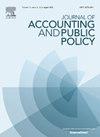Incentive effects of tax transparency: Does country-by-country reporting call for arbitration?
IF 2.2
3区 管理学
Q1 BUSINESS, FINANCE
引用次数: 0
Abstract
The OECD proposes mandatory fiscal arbitration as a means of dispute resolution between tax authorities to avoid double taxation of multinational enterprises' profits. We investigate the effects of mandatory fiscal arbitration on tax-audit qualities in a two-country setting with country-by-country reporting (CbCR) and a tax rate differential. Our analytical model shows that tax-audit quality in the high-tax country increases under CbCR because finer information raises tax-audit effectiveness. In contrast, the low-tax country refrains from auditing as it benefits from profit shifting. While arbitration resolves double taxation, its effects on tax-audit quality depend on the procedure in place. An approach based on exogenous negotiation powers lowers audit quality, a final-offer arbitration preserves audit quality, and an independent-opinion arbitration with minimum-quality requirement offers the strongest audit incentives: even the low-tax country engages in auditing. Our findings contribute to the policy debate about interdependencies between firm-level tax policies, national fiscal enforcement, and international fiscal cooperation.
税收透明度的激励效应:国别报告是否需要仲裁?
经合组织建议强制性财政仲裁作为税务机关之间解决争议的一种手段,以避免对跨国企业的利润进行双重征税。我们研究了强制性财政仲裁对两国背景下国别报告(CbCR)和税率差异的税务审计质量的影响。我们的分析模型表明,在CbCR下,高税收国家的税务审计质量有所提高,因为更精细的信息提高了税务审计的有效性。相比之下,低税收国家避免审计,因为它从利润转移中受益。虽然仲裁解决了双重征税问题,但它对税务审计质量的影响取决于所采用的程序。基于外生谈判权的方法降低了审计质量,最终报价仲裁保持了审计质量,最低质量要求的独立意见仲裁提供了最强的审计激励:即使是低税收国家也会参与审计。我们的研究结果有助于关于企业层面税收政策、国家财政执行和国际财政合作之间相互依赖关系的政策辩论。
本文章由计算机程序翻译,如有差异,请以英文原文为准。
求助全文
约1分钟内获得全文
求助全文
来源期刊

Journal of Accounting and Public Policy
Multiple-
CiteScore
4.80
自引率
2.80%
发文量
75
期刊介绍:
The Journal of Accounting and Public Policy publishes research papers focusing on the intersection between accounting and public policy. Preference is given to papers illuminating through theoretical or empirical analysis, the effects of accounting on public policy and vice-versa. Subjects treated in this journal include the interface of accounting with economics, political science, sociology, or law. The Journal includes a section entitled Accounting Letters. This section publishes short research articles that should not exceed approximately 3,000 words. The objective of this section is to facilitate the rapid dissemination of important accounting research. Accordingly, articles submitted to this section will be reviewed within fours weeks of receipt, revisions will be limited to one, and publication will occur within four months of acceptance.
 求助内容:
求助内容: 应助结果提醒方式:
应助结果提醒方式:


